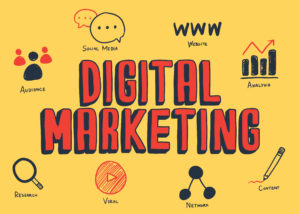
1. Digital Marketing
In the contemporary business landscape, the prowess of digital marketing has emerged as a game-changer, making it an enticing choice for those charting their after 12th exams educational journey. Digital marketing is not merely a course; it’s a gateway to understanding the dynamic world of online promotion, customer engagement, and brand visibility.

Why Digital Marketing?
- Versatility in Skill Acquisition:
Digital marketing courses go beyond traditional advertising methods. They encompass a diverse range of skills, including search engine optimization (SEO), social media marketing, content creation, email marketing, and data analytics. This versatility not only broadens your skill set but also allows you to adapt to the ever-evolving digital landscape.
- Real-world Application:
The beauty of digital marketing lies in its immediate applicability. As you learn the intricacies of various tools and platforms, you can simultaneously implement these strategies in real-world scenarios. This hands-on experience ensures a seamless transition from theory to practice, fostering a deeper understanding of the subject matter.
- High Demand in the Job Market:
Businesses are increasingly recognizing the importance of a robust online presence, fueling the high demand for digital marketing professionals. From startups to established corporations, companies are actively seeking individuals with the skills to navigate the digital realm effectively. This demand translates into a multitude of job opportunities for digital marketing graduates.
- Cost-Effective Marketing Solutions:
Unlike traditional advertising methods, digital marketing often proves to be more cost-effective. Learning how to maximize results with minimal expenditure is a valuable skill that can set you apart in the job market. Whether it’s creating compelling social media campaigns or optimizing content for search engines, digital marketing provides tools to achieve substantial results on a budget.
- Continuous Learning and Adaptation:
The digital landscape is fluid, with trends and technologies evolving rapidly. Digital marketing courses not only equip you with current knowledge but also instill a mindset of continuous learning. This adaptability is crucial in a field where staying ahead of the curve can make a significant difference in the success of marketing strategies. Read also: https://sdmiacademy.com/why-digital-marketing-skills-are-essential-in-2024-job-markets/
2. Web Designing
The skill of web design is essential for success in the constantly changing online environment. Beyond the aesthetic appeal, web designing plays a pivotal role in shaping user interactions and facilitating seamless navigation. Let’s delve deeper into why pursuing a course after 12th exams in web designing is not just a trend but a strategic career move after the 12th exams.

Web design work process from creative idea sketch plan to programming decoration on white background vector illustration
Why Web Designing?
- Essential Skills Development:
Web designing courses lay a strong foundation in essential skills such as HTML, CSS, and JavaScript. Understanding these programming languages empowers you to create visually appealing and functional websites.
- Responsive Design Mastery:
The rise of mobile devices has made responsive design a critical aspect of web development. Courses in web designing teach you how to create websites that adapt and function seamlessly across various screen sizes and devices.
- User-Centric Approach:
User Experience (UX) is at the core of web designing. Through these courses, you’ll learn to prioritize user needs, creating websites that not only look good but also provide a positive and intuitive user experience.
- Creative Expression:
Web designing is a canvas for creative expression. These courses introduce you to design principles, color theory, and layout techniques, allowing you to bring your artistic vision to life in the digital realm.
- Industry-Relevant Tools:
Web designing courses familiarize you with industry-standard tools like Adobe XD, Figma, and Sketch. Proficiency in these tools is highly valued in the job market, opening doors to diverse opportunities in the field.
- E-commerce Integration:
As businesses increasingly shift towards online platforms, understanding e-commerce design becomes crucial. Web designing courses often include modules on creating visually appealing and functional e-commerce websites, enhancing your marketability in the digital economy.
- Innovation and Trends:
The digital landscape is dynamic, with trends evolving rapidly. Web designing courses keep you abreast of the latest design trends, ensuring that you can create websites that are not only functional but also visually engaging and in tune with contemporary aesthetics.
- Freelancing Opportunities:
Armed with web designing skills, you have the flexibility to work as a freelancer. Many businesses, especially startups and small enterprises, seek skilled web designers for one-time projects, offering a diverse range of opportunities to showcase your talent.
3. Graphic Designing
In the dynamic landscape of web development and marketing, graphic designing emerges as a pivotal skill that goes beyond mere aesthetics. A course in graphic designing after 12th exams delves into the art and science of creating visually impactful content, catering to the ever-growing demand for engaging digital experiences.

Why Graphic Designing Matters:
- Visual Communication Excellence:
Graphic design is the language of visual communication. It teaches the principles of effective design, color theory, and layout, enabling professionals to convey messages in a visually compelling manner. Understanding how to captivate an audience through visual elements is essential in today’s saturated digital environment.
- Branding and Identity:
In today’s cutthroat business environment, developing a distinctive brand identity is essential. Graphic designers play a pivotal role in creating logos, brand assets, and promotional materials that resonate with a brand’s values. The ability to visually communicate a brand’s essence sets graphic designers apart as indispensable assets to businesses.
- Versatility in Design Elements:
Graphic designing extends beyond digital platforms to include print media, packaging, and promotional materials. A comprehensive graphic design course equips individuals with the versatility to create cohesive design elements across various mediums, ensuring a brand’s consistency and recognition.
- Adobe Creative Cloud Proficiency:
Adobe Creative Cloud, a suite of professional design tools, is the industry standard for graphic designers. Courses in graphic design often provide hands-on experience with software like Photoshop, Illustrator, and InDesign, enhancing proficiency in creating visually stunning and technically sound designs.
Why Choose Web Designing:
While graphic designing lays the foundation for visual communication, web designing takes it a step further by focusing on the creation of user-friendly and aesthetically pleasing websites. Here’s why pursuing a course in web designing is a strategic choice:
- Holistic Web Presence:
In today’s digital age, a business’s online presence is a significant factor in its success. Web designing courses teach students the technical skills needed to create and maintain websites, ensuring a holistic online presence that aligns with a brand’s identity.
- Responsive Design Principles:
Web designing courses delve into responsive design principles, emphasizing the importance of creating websites that adapt seamlessly to various devices. Understanding the intricacies of responsive design is essential for catering to the diverse ways users access online content.
- User Experience Optimization:
Web designing places a strong emphasis on user experience (UX), focusing on creating interfaces that are intuitive and enjoyable to navigate. A well-designed website not only attracts visitors but also keeps them engaged, contributing to higher user satisfaction and increased conversion rates.
- Coding Fundamentals:
Unlike graphic designing, web designing often includes coding fundamentals such as HTML, CSS, and JavaScript. This technical knowledge empowers individuals to not only design visually appealing websites but also implement and customize their creations from a technical standpoint.
4. UI/UX Design
In the digital landscape, user interface (UI) and user experience (UX) design play a pivotal role in shaping how users interact with websites and applications. UI design focuses on the visual aspects, ensuring that the interface is aesthetically pleasing and user-friendly. On the other hand, UX design delves into the overall user experience, considering factors such as usability, accessibility, and the emotional response of the user.

Why UI/UX Design?
- High Demand for Design Thinkers:
As businesses increasingly prioritize customer satisfaction, the demand for professionals who can create intuitive and delightful digital experiences is on the rise. UI/UX designers are instrumental in ensuring that users not only find the interface visually appealing but also navigate through it seamlessly.
- Enhanced Usability and Accessibility:
UI/UX design principles are centered around creating interfaces that are easy to use for a diverse audience. By understanding user behavior and incorporating accessibility features, designers ensure that their creations are inclusive and cater to users with varying needs and preferences.
- Innovative Problem Solving:
UI/UX designers are problem solvers at heart. They analyze user interactions, identify pain points, and propose creative solutions to enhance the overall experience. This role requires a blend of analytical thinking and creativity, making it an ideal choice for those who enjoy solving complex puzzles.
- Versatility Across Industries:
UI/UX design skills are applicable across a wide range of industries, from e-commerce and finance to healthcare and technology. This versatility provides designers with the opportunity to explore diverse domains and contribute their expertise to different sectors.
- Continuous Evolution and Learning:
The field of UI/UX design is dynamic, with evolving trends, technologies, and user preferences. This constant evolution ensures that designers are always learning and adapting, keeping their skills relevant in an ever-changing digital landscape.
Recommended Courses:
For those interested after 12th exams in pursuing UI/UX design, platforms like Interaction Design Foundation and Coursera offer comprehensive courses covering topics such as wireframing, prototyping, user research, and design thinking. These courses provide a solid foundation for understanding the principles and practices essential for a successful career in UI/UX design.
5. Content Writing
In an era dominated by information, the skill of articulating thoughts effectively holds paramount importance. Content writing, as a course after 12th exams, offers a unique blend of creativity and strategy that can set you on a distinctive career path.

Why Content Writing Matters:
Content is the backbone of the digital landscape, fueling websites, social media, and marketing campaigns. A well-crafted piece of content has the power to engage, inform, and persuade—a skill set highly sought after in today’s competitive job market.
Course Highlights:
Enrolling in a content writing course exposes you to the intricacies of creative writing, blogging, and content strategy. Platforms like Coursera and Skillshare provide a diverse range of courses, covering topics such as SEO writing, copywriting, and crafting compelling narratives.
- SEO Writing:
Understanding the principles of Search Engine Optimization (SEO) writing is crucial for creating content that not only captivates the audience but also ranks well on search engines. Courses in SEO writing teach you how to incorporate relevant keywords, optimize content structure, and enhance online visibility.
- Copywriting:
For those inclined towards marketing, copywriting is a specialized skill that focuses on creating persuasive and compelling content to drive sales. Learn the art of crafting catchy headlines, persuasive product descriptions, and effective calls-to-action to leave a lasting impact on your audience.
- Crafting Compelling Narratives:
Storytelling is a timeless art that transcends mediums. Content writing courses often delve into the nuances of crafting compelling narratives, allowing you to connect with your audience on a deeper level. This skill is invaluable, especially in fields like branding and digital marketing.
- Versatility in Writing Styles:
Content writing courses expose you to various writing styles and formats, from blog posts and articles to social media content and email marketing. This versatility equips you with the ability to adapt your writing to different platforms, broadening your scope and marketability.
Career Opportunities:
The demand after 12th exams for skilled content writers is on the rise, spanning industries like digital marketing, journalism, and corporate communications. As businesses recognize the importance of quality content in building brand identity and engaging customers, content writers play a pivotal role in shaping online narratives.






